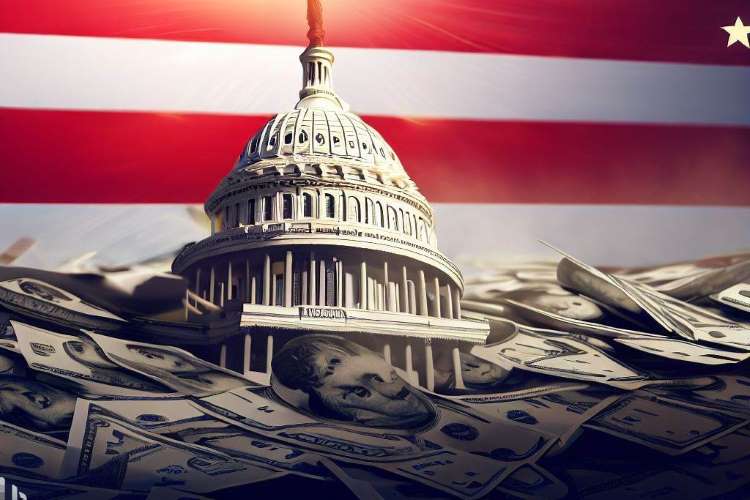
The recent fiscal developments in the US have some very important lessons for the rest of the world. The US government came perilously close to defaulting on critical payments because of brinkmanship by Congress Republicans. The US debt ceiling has been discussed numerous times in the last 106 years, and the ceiling has been raised more than 100 times since it was first imposed in 1917. In the US, especially after the collapse of Lehman Brothers in 2008, the debt-to-GDP ratio has significantly increased.
The gross fiscal deficit of the US is also high. According to the Maastricht Treaty, the prudent limits of debt and deficit to GDP should normally not exceed 60% and 3%, respectively. In the US, the debt-to-GDP ratio stood at 121.7% and the deficit is 6.3% of GDP in 2022.
READ I India set to open the space sector to global investors
US debt and global inflation
In recent research undertaken at the International Monetary Fund and published in the IMF’s Fiscal Monitor released in April 2023, a direct relationship between deficit and inflation is being established. The hypothesis is that a rising gross fiscal deficit (GFD) can be inflationary. Thus, we have a double pressure on inflation: one from traditional monetary policy and money supply, and the other from fiscal policy.
As is well known, the expansionary monetary policy is reflected in the balance sheet of the US Fed which increased 8 times between 2008 and 2022, while the deficit, which was 2% of GDP in 2006, has ranged between 4% and 14% during the period between 2008 and 2022. The debt-to-GDP ratio has more than doubled between 2007 and 2022.
The last-minute compromise deal between the Democrats and the Republicans would prevent a crisis for the time being. But had the deal not happened and the US had breached the debt ceiling, it would have had harmful implications for the global economy in the immediate future. The negative impact on the stock market, closure of some government departments, downgrading by rating agencies, rising unemployment, and general loss of credibility in the US economy would have direct global economic sentiments.
On an average, about $500 billion worth financial instruments are traded in international markets, which would have also been badly impacted. The use of the 14th Amendment could have led to another set of challenges, including a constitutional controversy in the U.S. That would not have been good for the U.S. economy as well as the global economy.
The deal would still have negative implications for the global economy. The debt ceiling pact between the Democrats and the Republicans divides the expenditure into defence and non-defence. In the expenditure on non-defence, there is a moratorium on increasing it for two years. But in the expenditure on defence, no such rule applies. Therefore, there is a possibility of cross-financing and a higher correlation between defence and non-defence expenditure.
It is apparent that the Russia-Ukraine war needs to be financed and, therefore, the US does not want any reduction in defence expenditure. Thus, fiscal discipline, which as it was, has not been the hallmark of the US administration since 2008, would not be there in the next few years. Fiscal profligacy would continue as it has been since 2008, in a big way. The expenditure pattern of the US government reveals that nearly 8% of the budget is dedicated to interest payments, which is a substantial chunk of expenditure. This would increase as the economy is shrinking, and borrowings are expected to rise.
Lessons from US debt ceiling crisis
The rest of the world can learn a few lessons from the ongoing crisis in the US.
- Each country needs to fend for itself as the fiscal profligacy in the US is bound to cause spillovers into emerging countries, especially large emerging economies like India.
- The war in the Russia-Ukraine region will continue as fiscal provisions are made.
- The debt-to-GDP ratio and the deficit-to-GDP ratio which significantly exceed prudent limits will continue to be high for the next few years.
- According to well-researched IMF documents and the literature indicating that fiscal deficits can be inflationary, it can be safely concluded that inflationary pressures will continue to be high in the U.S.
- The aggressive interest rate policy hike of the US Fed will continue to put pressure on other countries to protect their exchange rates, stock markets, and capital flows.
- Finally, the global economy will remain in an uncertain phase for the next few months, impacting growth and economic recovery, which is much needed in the post-COVID period.
Dr Charan Sigh is a Delhi-based economist. He is the chief executive of EGROW Foundation, a Noida-based think tank, and former Non Executive Chairman of Punjab & Sind Bank. He has served as RBI Chair professor at the Indian Institute of Management, Bangalore.

